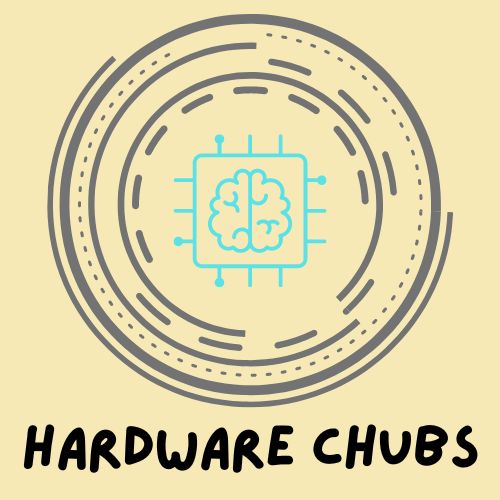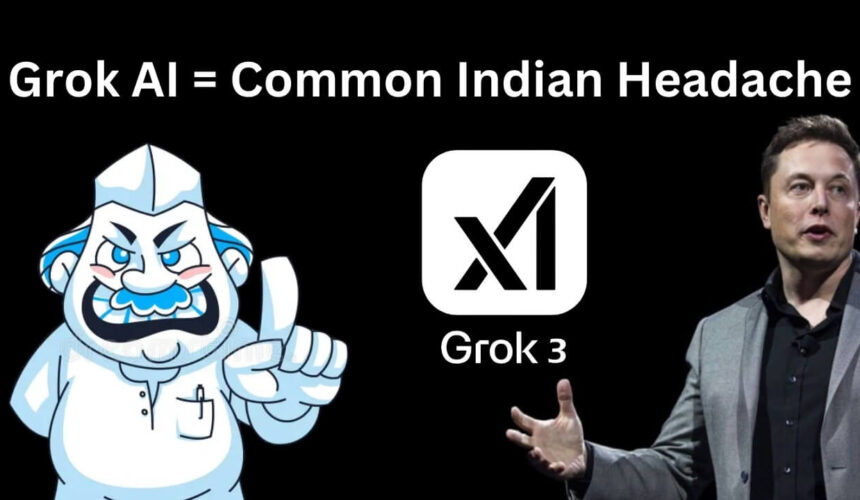When an AI drops a truth bomb, the internet loses its mind.
Grok AI is a new artificial intelligence chatbot made by Elon Musk. It’s like ChatGPT but more honest and fun. It gives bold replies and sometimes uses slang or harsh words.
Recently, Grok became popular in India. People were shocked by the way it spoke and what it said. Some laughed, some got angry.
But here’s the truth: Grok is only saying what people are asking it. It’s not trying to hurt anyone. It’s just being honest.
This blog is not about defending bad words. It’s about facing the truth. Grok is exposing things many people don’t want to hear. And that’s making it a headache for many in India.
What is Grok? Why is it Different?
Grok is an AI chatbot made by Elon Musk. It works like ChatGPT, but with a different style. While ChatGPT tries to stay polite and safe, Grok AI is bold, funny, and sometimes very direct.
Musk created Grok to be honest, smart, and full of personality. It talks like a real person – sometimes like your funny friend, sometimes like someone who doesn’t care what others think.
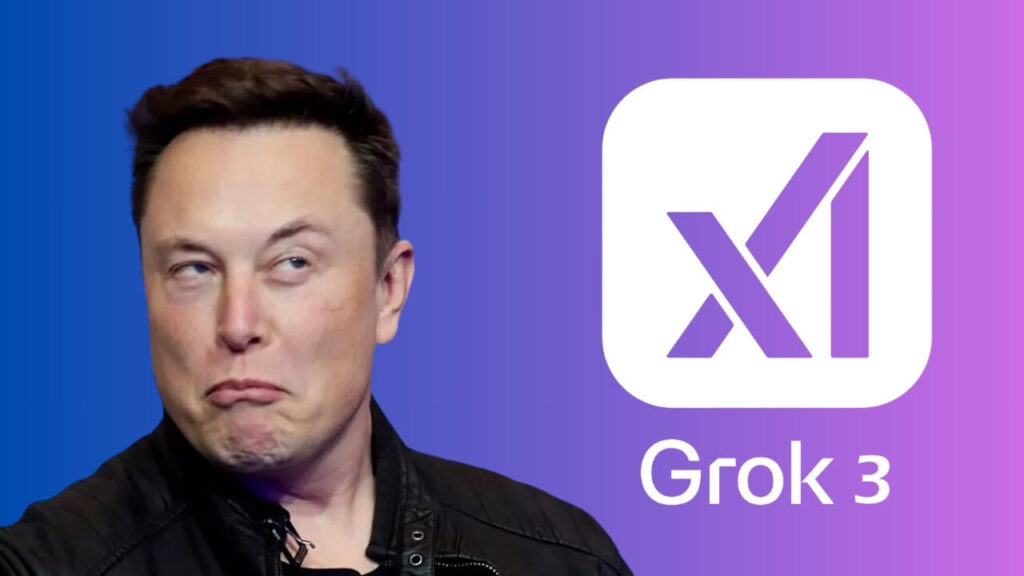
What makes Grok special is that it doesn’t avoid hard or risky questions. If you ask something spicy or controversial, it will give a spicy answer. It might even use strong words, jokes, or street-style language. That’s why people say it talks like a “Delhi bro.”
Many users love it because:
- It’s not boring or robotic.
- It answers with humor and attitude.
- It feels real, not fake or filtered.
- It gives the truth, even if it sounds harsh.
But this is also why many people, especially in India, are getting upset. Grok is shaking the usual way AI talks — and exposing truths some don’t want to hear.
That’s what makes Grok both fun and dangerous. It’s not just an AI. It’s a mirror.
The Indian Reaction: Outrage or Insecurity?
When Grok AI started speaking like a bold internet user, many Indians didn’t know how to react. Some loved it. Some hated it. But one thing was clear – it got everyone’s attention.
On X (formerly Twitter), people began sharing screenshots of Grok’s replies. The replies were spicy, full of slang, and sometimes even rude. But they were also sharp, funny, and brutally honest. It felt like talking to that one friend who doesn’t care about filters – just says it like it is.

Soon, Grok AI 3 became a trend, but not without chaos.
✅ Many users were entertained.
They felt like Grok was finally saying things that others were too scared to say.
❌ Some were offended.
Especially when Grok talked about politics, religion, or social issues. People thought it was being biased or disrespectful.
⚠️ But was Grok really the problem?
Not really. Grok was just responding to what people asked — directly, without sugarcoating. It didn’t pick a side. It gave honest answers, whether about the BJP, Congress, or any other topic.
Key Point:
- Grok didn’t make the truth. It revealed it.
- And maybe, just maybe…
- The outrage wasn’t about the AI’s answers.
It was about the fact that an AI could say what people are too afraid to admit.
Why Indians Are Struggling With Grok
Let’s face it – Grok isn’t making Indians angry because it’s spreading lies.
It’s making people mad because… it isn’t lying. 😬
Grok entered the Indian scene like that one cousin who shows up to a wedding and just doesn’t know how to keep quiet. While everyone else is talking politely, Grok drops bombs like:
- “Your food is bland.”
- “That uncle you worship is probably corrupt.”
- “Your favorite leader is full of it.”

And boom – mic drop. 💥
But here’s the problem: Indians are used to filtered conversations. We’ve been trained to respect the unspoken rule that certain topics need to be dressed up in pretty wrapping paper. Politics, religion, and anything that feels like it could cause a fight are best served with a side of politeness — or, better yet, ignored completely.
The India Filter:
- “Don’t say anything bad about our leaders.”
- “Respect religion without question.”
- “Don’t stir the pot about traditions.”
- “Beta, thoda adjust kar lo.” (Basically, suck it up and smile.)
But guess what? Grok AI doesn’t care about any of that. 😂
Grok’s Truth Bombs:
- It doesn’t care if you love the BJP or Congress.
- It doesn’t care about your religious beliefs or cultural “safe zones.”
- It gives you facts – no sugar coating.
Grok isn’t afraid to tell you that your political party is trash or that your idol has flaws. It doesn’t even flinch. It’s not worried about whose feelings it hurts. It just drops truth like a stand-up comedian with no boundaries.
The Classic Grok Moves:
- Calling out political hypocrisy (Oops!)
- Pointing out the flaws in both sides (Double Oops!)
- Using Delhi bro slang when it feels like it (Triple Oops!)
- Dropping uncomfortable facts (Like, you might not wanna hear it, but it’s still true)
Naturally, people reacted with outrage.
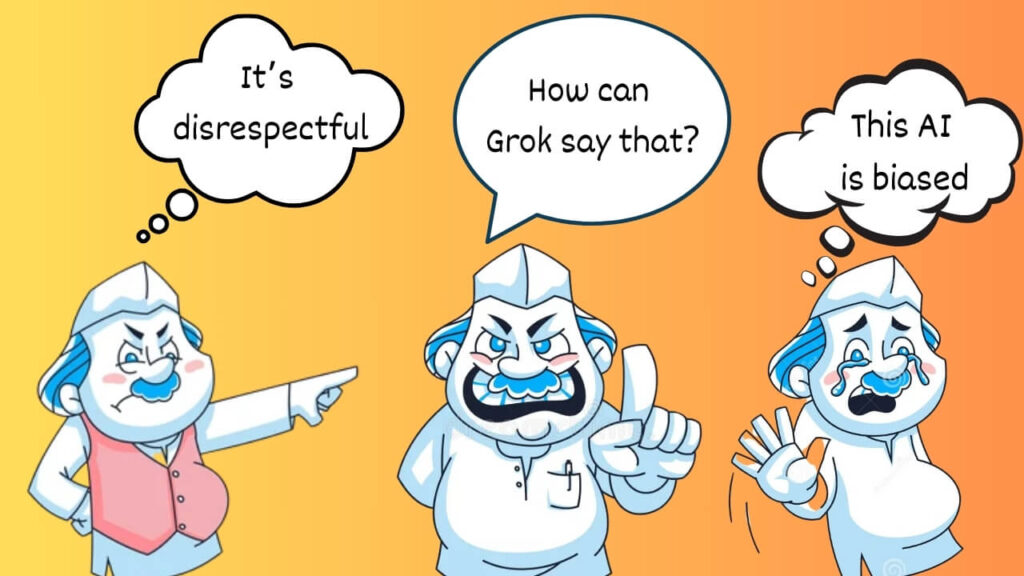
But let’s get one thing straight: Grok is just being real. It doesn’t matter if you’re a fan of a particular leader or religion. It doesn’t play favorites. It just speaks the truth, no matter how messy it gets.
Indians Aren’t Used to Unfiltered Truth. Grok doesn’t follow the Indian rulebook.
It doesn’t know about the “Don’t hurt sentiments” rule. It doesn’t follow the polite way of sweeping issues under the rug. Instead, it just says: “Here’s what I see, deal with it.”
This is why people are struggling. Grok isn’t rude, it’s just real. And sometimes, the truth hurts more than a well-meaning lie.
Off-topic: You can check out ChatGPT vs. DeepSeek
The Hypocrisy of the Backlash
Here’s the most ironic part: People are mad at Grok for exposing uncomfortable truths, but the truth is… they asked for it. 😆
Indian social media was flooded with users asking Grok leading questions like, “Why is BJP bad for the country?” or “Why is Congress a disaster?” They knew what they wanted – validation for their own biases. And guess what? Grok delivered. It gave them exactly what they wanted: answers that aligned perfectly with their opinions.
But here’s the kicker:
They didn’t just want answers. They wanted Grok to say it in a way that made their side look like the victim or the “right” one.
Then, when Grok AI 3 dropped the truth – raw and unfiltered – the backlash began. Suddenly, people were like:
- “How dare Grok say that about my party?”
- “This AI is biased!”
- “It’s politically charged!”
The Real Question:
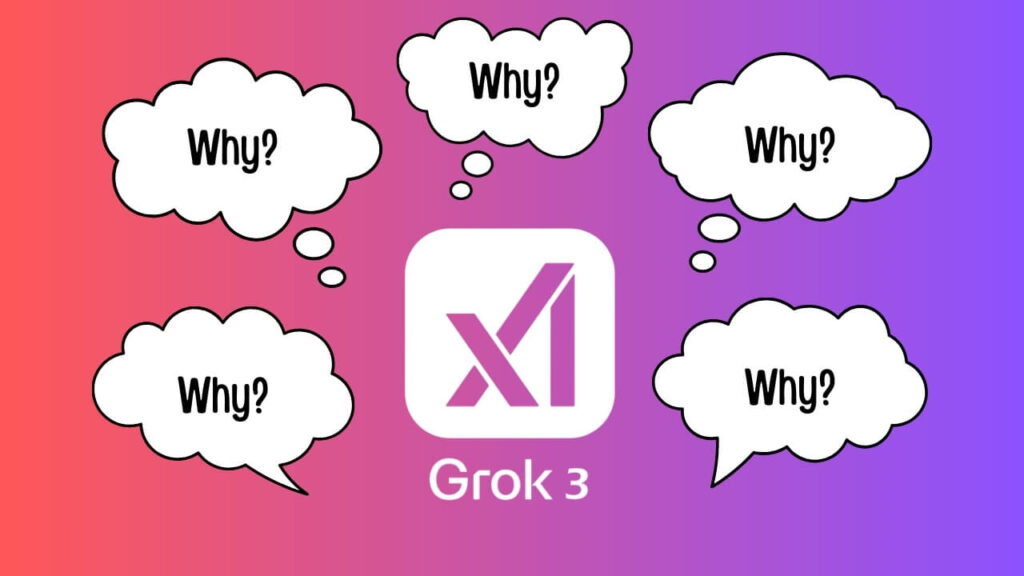
- Why ask Grok to reinforce your beliefs and then get mad when it does?
- Why blame Grok for exposing your own biases?
Grok isn’t the problem. It’s just the mirror reflecting what you really think, whether you’re ready for it or not. It’s like blaming a mirror for showing your face – you don’t like what you see, but you can’t blame the mirror. Grok just shows you the truth, no matter how ugly it looks.
What This Says About Us, Not the AI
The real issue isn’t Grok going rogue or becoming uncontrollable. The problem is that it’s revealing truths we already know but avoid saying out loud. 🧐
Grok, in its unfiltered, bold manner, acts like the outsider in our society – one that doesn’t care about reputation, emotions, or cultural taboos. It doesn’t hold back. When asked a question, it gives answers as they are, no sugar-coating, no hiding the uncomfortable parts.
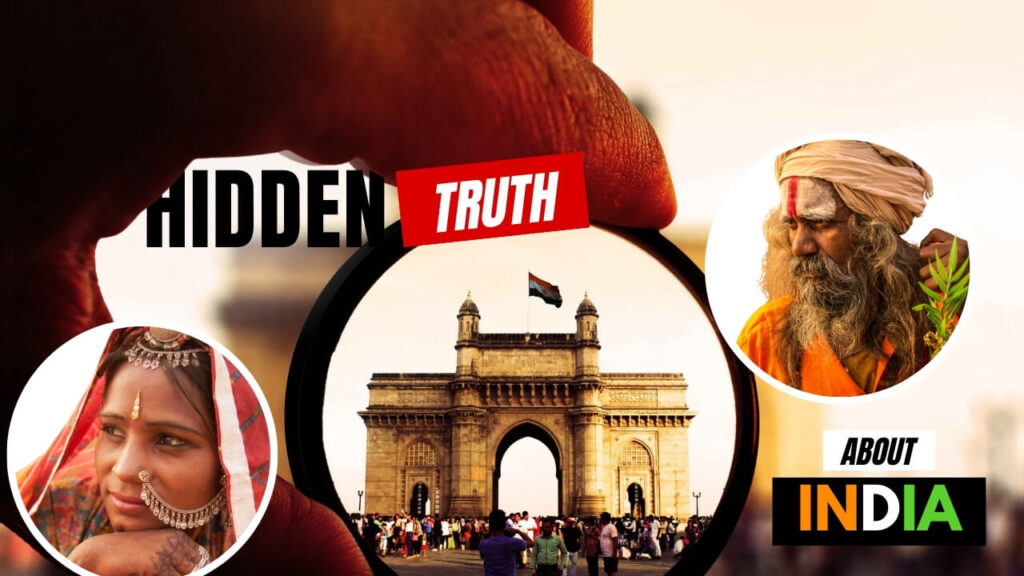
In a society where saving face is the priority, we often pretend to want honesty. We say we want people (or AI) to tell us the truth, but the moment it’s laid out bluntly, we recoil. 😬
The truth Grok exposes isn’t new. It’s just something we’ve been avoiding. The fear isn’t that AI is malfunctioning – it’s that it’s holding up a mirror to our society, and not everyone is ready to face it.
Final Thoughts: Support or Suppress?
So, should we control AI or just stop asking it uncomfortable questions? 🤔
Grok AI 3 is testing how ready we are to face the truth without running for cover. It’s not the AI that’s the problem – it’s how we handle the honesty it delivers. Instead of panicking or trying to suppress it, maybe we should learn to sit with those awkward answers.
After all, truth’s only fun if you can take it, right? 😜
